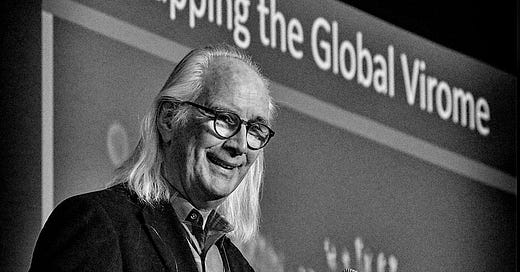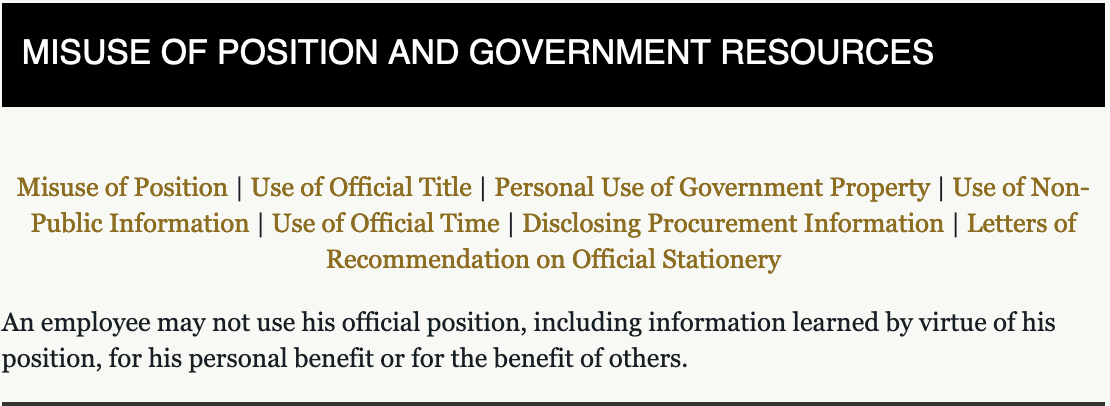Virome Violation: In Pursuing Science, Did Researchers Abuse Federal Law?
Funds from USAID’s pandemic program helped set up the private Global Virome Project now led by former USAID scientist.
7 minute read
New documents point to possible misuse of government resources by Dennis Carroll, a former federal official who ran the pandemic response program at United States Agency for International Development (USAID). While at USAID, Dennis Carroll oversaw a federal program called PREDICT, from which funds were used to launch another organization called the Global Virome Project. After leaving USAID, Carroll then became chair of the Global Virome Project’s board.
“It would appear that Dennis Carrol violated federal law that prohibits the use of official resources for private gain or for that of persons or organizations with which he is associated personally,” Craig Holman of Public Citizen said when shown emails made public by the nonprofit US Right to Know. “Official resources—including government means of communications, government-funded travel or even the use of one’s official title—may not be used to promote private interests, such as the Global Virome Project.”
Over the weekend, Dennis Carroll was sent several questions about his fundraising efforts for the Global Virome Project while he was employed at USAID. Carroll did not respond to multiple requests for comment. USAID was also sent questions that asked for Carroll’s exact date of retirement, the nature of Carroll’s fundraising for the Global Virome Project, and whether this activity violated the law.
“We are working on answers to your questions, but unfortunately, we are not going to meet your deadline today,” wrote a USAID press officer.
The Justice Department warns that a federal employee may not use an official position for personal benefit or for the benefit of others. “An employee engaging in fundraising in his personal capacity is also prohibited from using his official title, position or authority. In addition, he cannot solicit funds or other support from a subordinate or from any person that has business with his component.”
While still in government service, Carroll oversaw USAID’s PREDICT, a project to detect and discover viruses with pandemic potential. Contractors funded through PREDICT have included scientist Jonna Mazet at the University of California, Davis; the research firm Metabiota; and scientists at EcoHealth Alliance, a nonprofit operated by Peter Daszak.
Last October, the Washington Post editorial board called on Daszak to testify before Congress about his ties to researchers at the Wuhan Institute of Virology, in order to help the public better understand how the pandemic began. “Mr. Daszak has been particularly aggressive in promoting the zoonotic spillover hypothesis and attacking the laboratory leak as a ‘conspiracy theory,” wrote Post editors.
Since that Washington Post editorial, pressure against Mr. Daszak continues to build. Two weeks ago, several members of Congress sent the National Institutes of Health (NIH) a letter that called on the agency to investigate EcoHealth Alliance for contract irregularities and anonymous private donations, in violation of federal statute.
The legal structure of the Global Virome Project is unknown, and its website does not state whether it is a company or a nonprofit. The first media report of the organization seems to be a 2016 STAT article that quotes several experts discussing the need for the Global Virome Project (GVP). “USAID funds PREDICT, the ongoing pilot project,” STAT reported. The article quoted Dennis Carroll saying that a $3.4 billion price tag for the GVP is an overestimate.
The reporter with STAT also interviewed UC Davis’s Jonna Mazet.
Mazet is a key player in an ambitious endeavor called the Global Virome Project, which has proposed cataloguing nearly all of the unknown viruses lurking in nature around the world. In a nutshell, Mazet and other experts want to search out mystery threats before they find us.
The idea has been around for a while and is supported by individual scientists and organizations including the US Agency for International Development, the nonprofit EcoHealth Alliance, HealthMap, ProMED, and the epidemic risk firm Metabiota.
Raising money
Nine months after STAT’s article, Edward “Eddy” Rubin of Metabiota sent an email on August 11, 2017, to a professor at UC Berkeley. In the email, Rubin asked if the GVP fell into the domain of Open Philanthropy, a foundation started by a former co-founder of Facebook.
“I have been working with the US Agency for International Development (USAID) on helping to launch a large international project called the Global Virome Project (GVP),” Rubin wrote to the professor. “It has so far been championed by the USAID Pandemic Threat Program, who have already invested ~ 180 million in a successful proof of principle pilot project. For the projects next stage, it needs to become a global project completely separate from the US Government ….”
Rubin later forwarded an email from this same Berkeley professor, who wrote that Open Philanthropy did not seem interested in the GVP. “That’s really too bad,” responded Cara Chrisman at USAID. “Thanks for the update, though!”
A week after he pitched the GVP to Open Philanthropy, Rubin emailed Carroll about another opportunity. “The Science Philanthropy Alliance has several foundation partners and so they are sort of a philanthropy brokerage,” Rubin wrote. “As I mentioned on the GVP call we went to them last time we had an ask for 3 Billion + and it might be useful to have them think of us again with a more realistic ask.” Rubin also included the draft of an email that Carroll could send to executives at the Science Philanthropy Alliance.
USAID’s Chrisman later contacted Rubin about the email to Dennis Carroll. Rubin then wrote to Chrisman, “My thought was that Dennis would send Science Philanthropy Alliance a version of the draft note I provided him with.”
“Thanks for confirming,” Chrisman wrote back. “Dennis will be back in the office tomorrow and we can move this forward.”
Next: UC San Francisco
In a separate incident, professor Dean Jamison emailed administrators at the University of California-San Francisco, in late August 2017. Jamison explained in the email that Dennis Carroll had commissioned a cost benefit analysis of the Global Virome Project. “This will be funded through USAID PREDICT at Jonna’s institute at UCD,” Jamison wrote, copying Jonna Mazet of UC Davis on the email. “I will be involved on the economic side. Several staff of Metabiota who were responsible for the DCP3 pandemics chapter will be involved on the modeling side.”
After several more emails discussing a budget for Jamison and how to transfer funds between universities, Mazet wrote that they would need to describe the scope of work and financing for salary and travel. “Should be super straight forward,” Mazet responded.
That same month, members of PREDICT shared the minutes of a meeting where they discussed a “GVP Business Plan.” This email noted that the group was drafting an article for Science Magazine. In a discussion of “outreach,” the minutes remarked, “Eddy and Dennis will be in Canada to share information on GVP … Upcoming deadline for Canadian funding is December.” The minutes also discussed contacting the Skoll foundation, and meeting with the British Consulate in San Francisco because they are connected to the Wellcome Trust, a major funder of biomedical research.
In late October 2017, an assistant at UC Davis emailed a USAID official and asked to fund Metabiota’s Eddy Rubin with PREDICT money so that Rubin could discuss the GVP in China. “Through Dennis Carroll, he has been invited by the embassy in Beijing to stop there for a night and meeting with various government partners to discuss GVP,” the assistant wrote. “He would only need PREDICT to fund one night in a hotel and transport to and from the airport; Eddy’s flight is being covered by the conference.” The official at USAID then approved the funding.
Rubin later emailed Carroll, Mazet and Daszak about the meeting with embassy officials, and reported that the State Department and embassy staff were supportive of the GVP. Rubin also remarked that US ambassador Terry Branstad knew about the project and had President Trump’s ear. “The present US administration very receptive to anything that smells of commerce,” wrote Rubin, adding that support of the Global Virome Project by tech companies was good.
In January 2018, an assistant at UC Davis emailed an official at USAID to ask him to approve bookings and accommodations for several people attending a Global Virome Project meeting, while also attending a scientific conference on pandemics in Bangkok, Thailand. “Per verbal discussion with Dennis Carroll,” the assistant wrote in the request. An official at USAID then approved.
That February, USAID approved PREDICT funds to pay for professor Oyewale Tomori to travel from Lagos, Nigeria to Washington, DC, to discuss the Global Virome Project. A few weeks later, Tomori’s name appeared on an essay published in Science Magazine that advocated for the Global Virome Project. “We describe a Global Virome Project (GVP) aimed to launch in 2018 that will help identify the bulk of this viral threat and provide timely data for public health interventions against future pandemics,” reads the three-page project pitch.
The lead signatory was Dennis Carroll, who was then still at USAID. Other authors of the essay were the EcoHealth Alliance’s Peter Daszak, Metabiota’s Nathan Wolfe, and Jonna Mazet of UC Davis.
End of PREDICT
In October 2019, the New York Times reported on the demise of USAID’s PREDICT project. The article quoted Dennis Carroll saying that in January “Predict was essentially collapsed into hibernation.” The Times reported that Carroll retired when PREDICT shut down, although it did not report the date of Carroll’s retirement. The Los Angeles Times later reported that PREDICT shut down in September 2019, and that the program had funded laboratory equipment for the Wuhan Institute of Virology.
Starting in February 2020, several news outlets such as USA Today, Kaiser Health News, and the Los Angeles Times reported that Dennis Carroll had become chair of the Global Virome Project.
On its website today, the Global Virome Project’s list of board members includes Peter Daszak of the EcoHealth Alliance, Jonna Mazet of UC Davis, Oyewale Tomori of Nigeria, and Edward “Eddy” Rubin of Metabiota. Dennis Carroll as listed as the board’s chair.
“Whether or not Carrol is currently receiving lucrative compensation as chair of the Project is beside the point,” said Public Citizen’s Craig Holman, adding that Carroll can still be held liable, even though he has left federal service. “The Inspector General’s office should investigate whether the law was broken and, upon finding probable cause, refer the case to the Department of Justice for prosecution.”










The sad truth is that these people don't even pretend to be operating within the boundaries of the law. And they won't be punished.
Jeezuz when will it end? Moreover, "cataloguing nearly all of the unknown viruses lurking in nature around the world" sounds as nutty and useless (how dya do it if they are, well, UNKNOWN?) as cataloguing all the near Earth objects lurking in outer space that might hit the Earth someday but excluding human-made space junk like the Elon Musk spacefill of satellites..